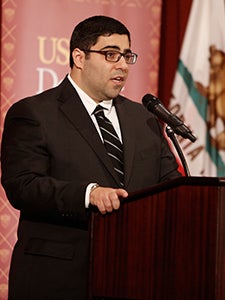Cultivating Curiosity
At a ceremony honoring his installation as the inaugural holder of the Turpanjian Early Career Chair in Contemporary Armenian Studies, Richard Antaramian delineated two reasons why Armenian studies is a crucial field.
The first, he said, stems from the Armenian people’s intricate history.
“Armenians have, over the centuries, ruled over their own kingdoms, been subject to others, circulated through empires in the modern and early modern periods, converted to and from different religions and constructed a worldwide network of churches,” he said. “They have suffered genocide — and survived — produced a transnational diaspora and dabbled in most every ‘ism’ you can imagine.”
The second, he said, is to create “scholarship of consequence,” challenging long-held, although not necessarily founded, beliefs.
“In Armenian public discourse, we too often unflinchingly and unquestioningly accept the dictates of self-anointed intellectuals, the self-appointed watchmen of our communal boundaries,” Antaramian said.
At the installation ceremony held March 12 at Town and Gown, USC Dornsife Dean Steve Kay espoused the importance of having a strong Armenian studies program in Los Angeles, which has such a large and diverse Armenian population.
“At USC, we are showing that Armenian studies is more than a chapter in a history book,” Kay said. “It is literature, science, politics, religion, and sociology. It is past; it is present. And it is future. It is filled with stories of victory and tragedy, innovation and warfare. It is a discipline that is hugely complex, but also hugely important.”
Gerald Turpanjian, who with his wife Patricia endowed the chair through the Turpanjian Family Educational Foundation, established the position with the hope that supporting the professor in the nascent stages of his career would allow Antaramian to cultivate USC’s Armenian studies program as he simultaneously grows his own body of work.
Interim University Provost Michael Quick lauded Turpanjian’s visionary idea.
“We often hear that the endowed chair allows a scholar to sustain his or her research,” Quick said. “But what I’m struck by is that this particular chair is an act of creating a field of study here at USC. The chair demonstrates a commitment to Armenian studies that will draw the attention of new students and faculty from around the world.”

Richard Antaramian describes why Armenian studies is a crucial area of scholarship.
As the Turpanjian Early Career Chair, Antaramian will expand the dissertation he completed at the University of Michigan titled “In Subversive Service of the Sublime State: Armenians and Ottoman State Power, 1844–1896” into a book. He will also teach undergraduate courses on subjects such as the history of the Armenian Diaspora and the Ottoman Empire.
“A liberal arts education produces not only better-informed and engaged citizens, but also critical thinkers,” Antaramian said.
Further explaining why Armenian studies in particular epitomizes the liberal arts ethos, he said, “Given the grist we are provided, Armenian studies should be not only at the cutting edge of our respective fields, but also instrumental in pushing the disciplinary boundaries that give shape to our modes of inquiry.”
Like Turpanjian — who immigrated to the United States from Lebanon to pursue higher education — Antaramian has Armenian roots, which piqued his interest in the field when he was only a teenager.
“My great grandfather Bedros came to this country in the early 1890s from a small town in Anatolia called Perri,” Antaramian recalled. “His goal was to earn enough money to pay off back taxes and bankroll a school, and then return home.”
But massacres intervened with his great grandfather’s plan and instead of going back to Armenia, he brought his wife and son to this country.
Antaramian expounded upon how his own college education changed his conception of his ancestors’ experience living in a foreign country — and what it means for people of a common origin to live scattered throughout the world, a phenomenon known as diaspora.
“I believed that by locating our family’s story in the national narrative, I was actually honoring my ancestors,” he said. “But as I took more history courses, however, the edifice began to crumble.”
Since that time, Antaramian has conducted rigorous historical research to help do justice to his great grandfather’s — and so many other Armenian immigrants’ —common experience.
To close the ceremony, Kay presented the Turpanjians with a miniature version of Antaramian’s chair to show the university’s appreciation of their generosity. He then presented Antaramian with an inscribed crystal book to honor his installation.
“What I see as the mandate for this chair is to produce knowledge and cultivate critical voices, ones that scrutinize every idea and challenge every –ism,” Antaramian said. “I’m ecstatic to be here and excited about the future.”